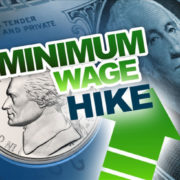THE Los Angeles City Council tentatively approved a measure on Wednesday, June 3, to raise the minimum wage to $15 an hour by 2020, making it the biggest city in the nation to make such a move.
The city council voted 13-1 in favor of an ordinance to raise the minimum wage, giving its support for the ordinance—written by City Attorney Mike Feuer—to move forward. Because the vote was not unanimous, the measure will return to the city council for a final vote next week.
Lone Republican and Councilman Mitchell Englander, who also voted against the wage increase during a preliminary vote in May, cast the dissenting vote in silence.
“Los Angeles has never set its own minimum wage before,” city officials said, “and [Wednesday’s vote] prompted several city council members to express hope that more cities—and the whole state of California—would also adopt higher wage laws to address economic inequality.”
LA Mayor Eric Garcetti, who has made it clear that he would sign the measure if it passes, said in a statement after the vote: “Today is a historic day in the City of Los Angeles. With this vote, the minimum wage will no longer be a poverty wage in Los Angeles. I want to thank the city council for joining me in building a city that provides greater opportunity and possibility for all our residents.”
Under the proposed ordinance, the citywide minimum wage would increase to $10.50 per hour in July 2016 for businesses with 26 or more employees, with a one-year delay for smaller (25 or fewer employees) businesses. Non-profits and small businesses have until 2021 to reach the $15 hourly mark.
The wage will then increase to $12 by July 2017, $13.25 by July 2018, $14.25 by July 2019, and up to $15 by July 2020. Once the wage reaches $15 per hour, for both small and large employers, the measure calls for the minimum wage in 2022 to keep increasing based on the cost of living, indexed to inflation.
On Wednesday, union members and those in favor of increasing the wage rallied on the steps of LA City Hall, saying the cost of living in the city “makes it impossible for people to survive.”
On the other side of the argument, many small business owners say they will have to raise prices if the minimum wage increases.
“Many businesses, over time, will leave LA if the ordinance passes,” said Ruben Gonzalez with the Los Angeles Area Chamber of Commerce.
The Los Angeles Business Council, a coalition of businesses that backed an earlier proposal by Garcetti to raise wages to $13.25 by 2017, warned its members that the council’s wage plan “goes too far.” The coalition hasn’t taken a formal position yet on the new law, LABC President Mary Leslie said earlier this week.
City leaders are expected to continue debating potential tweaks to the law, such as a proposed exemption from the $15 minimum wage for workers covered under collective bargaining agreements. Labor leaders who led the campaign to raise the minimum wage are pushing for inclusion of this exemption from the wage for their own union members.
Business leaders who had opposed the wage increase have lashed back at the labor groups, saying the same people who had wanted the pay hike in Los Angeles now want to exclude their own union members from the proposed law. They pointed to Seattle’s $15 minimum wage law, which does not have an exemption for unionized workers.
A state bill authored by Sen. Mark Leno (D-San Francisco) to raise wages to $11 an hour in 2016 and $13 in 2017 cleared the Senate earlier this week, and now heads to the Assembly. A similar bill introduced last year by Leno failed to pass both houses.
Councilman Paul Koretz said the passage of a new state minimum wage law would “help “reduce the pressure on the city,” while Councilman Curren Price said he wants to ensure LA’s new minimum wage law is the “model for the state and the nation.”
The City Council is also expected to consider including a requirement for employers to provide paid leave to workers, and a provision that would require employers to pass service charges onto the employee who performed the task.
The final ordinance may change before July 1, 2016, the date it will go into effect. Several controversial provisions, including the ones addressing union exemptions and service charges at restaurants, will be studied later and possibly added to the final document.
“Today is the day where Los Angeles said no to poverty,” City Councilman Mike Bonin said, following the vote. “Today is the day where Los Angeles said, ‘We’re not going to tolerate someone working full time and living below the poverty line.’ ”
(With reports from Los Angeles Daily News, NBC LA, ABC7)
(www.asianjournal.news)
(LA Weekend June 6-9, 2015 Sec. A pg.1)







